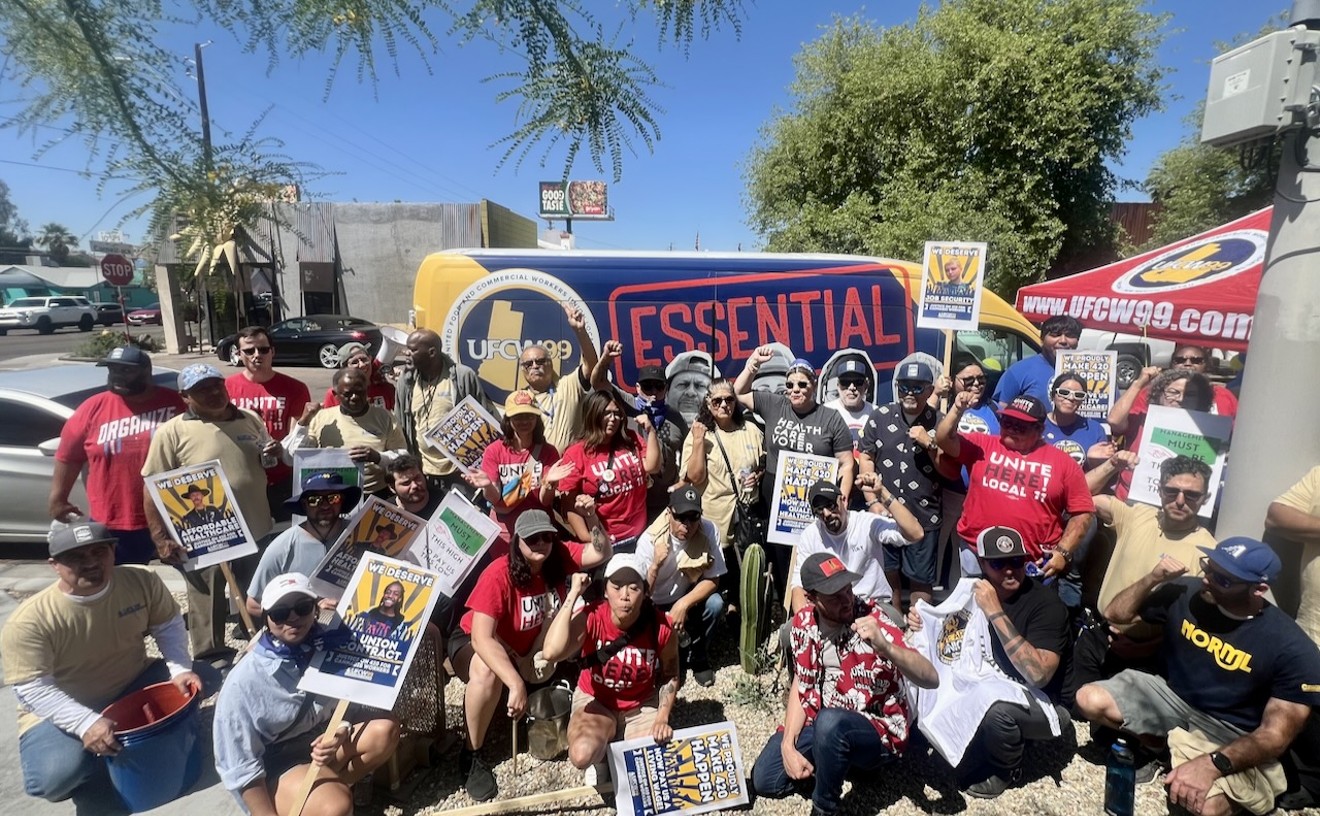A jury acquitted a former Phoenix police officer of criminal sexual assault charges last week, clearing the way for his accuser to seek damages via a civil lawsuit – which she's already in the process of doing.
Court records indicate that the 23-year-old woman, whose name New Times is withholding, filed a lawsuit on March 23 against Timothy Morris, his wife, and the City of Phoenix. As detailed in a December 2, 2015, New Times article by Miriam Wasser, an obscure Arizona law protects a "public entity" such as the City of Phoenix from liability in a felony act committed by an employee unless the entity had knowledge the employee had a "propensity" to commit the act. That means the accuser — called "Jane" in the article — would not have been able to collect damages from the deep-pocketed city.
With the help of her lawyer, she's now seeking the justice in civil court that she believes she was denied by the jury's May 5 decision in the criminal case.
Morris, meanwhile, is relieved to be back with his wife and five children after more than a year awaiting trial behind bars. He was arrested the day after he admitted to sexual acts with the handcuffed woman while she was in his custody, and a judge ordered him held without bond on two charges of sexual assault, one count of kidnapping, and one count of misdemeanor false reporting.
He claimed the sex was consensual. Jane said it wasn't.
Notably, that distinction no longer matters in cases like Morris and Jane's.
A little-known new law in Arizona calls for peace officers to be charged with a class 5 felony if they have any sort of sexual conduct with people in their custody. But the law went into effect on July 1, 2015. Morris' encounter with Jane occurred a week earlier, on June 25.
While out with a friend, Jane had been detained at 3 a.m. by a Scottsdale police officer who discovered she had a warrant for unpaid DUI fines in Phoenix. The 40-year-old Morris, who'd been a Phoenix officer since 2008, was supposed to take her to the Maricopa County Jail. Instead, in the parking lot of a Scottsdale drugstore, after the other officer left and while Jane was handcuffed in Morris' patrol car, he began asking the 23-year-old woman sexually charged questions, causing her to fear for her safety if she "didn't give him something," the woman said last year.
Morris admitted that he allowed Jane move to his side of the vehicle, away from the store's surveillance cameras, and that he removed her cuffs from behind her back and refastened them in front. After rubbing Morris's genitals with a shackled hand, Jane performed oral sex on the uniformed officer. He then drove her to her home in Phoenix, instructing her to say "the computer was down" if anyone asked how she'd avoided jail.
She reported the incident several hours later. Morris admitted the sex had occurred and resigned before any internal investigation could take place. Maricopa County Attorney Bill Montgomery moved forward with the charges.
But the jury of six men and six women didn't believe Morris had committed sexual assault and kidnapping.
The jury did, however, convict Morris of misdemeanor false reporting, for the lies he initially told to fellow officers. He was sentenced to six months in jail but was released on May 5 because he'd already served nearly 11 months.
The victim is "hurt" but has no comment at this time, her attorney, Jamal Allen, tells New Times.
Allen says he "has to respect" the jury-trial system but that the jury's decision could have a chilling effect on crime victims. From the beginning, Jane's motivation has been to let Morris, the City of Phoenix, and other women know "that it's okay to speak up if something like this happens," Allen says. "I can only imagine what this type of verdict communicates to women who are victims of any type of sexual assault."
Allen says he filed the civil suit on Jane's behalf in late March, two months before the criminal trial took place and two months before they would know whether Jane could collect any money from the city in the suit. If Morris had been convicted of even one felony, state law would have kicked in and immunized the city from liability in the case. But Morris was only convicted of a misdemeanor, allowing Jane to sue the city. Allen says they had to file in March because they'd submitted a notice of claim against the city six months earlier; state law requires a lawsuit to be filed within six months of filing the notice of claim. (Note: Another lawyer says that's not accurate — see below.)
"We gave the city the opportunity to resolve this matter," Allen says. "She waited as long as possible before filing a civil suit."
Jonathan Warshaw, Morris' attorney, says says the jury "obviously had serious questions about her credibility."
Jane was sexually aggressive toward his client and "came on to him," Warshaw says. Although she told the jury she was worried by the officer's demeanor and the fact that he was armed, Warshaw notes that his client never used force during the incident.
"If he wasn't a cop, I'm not so sure he would have been charged," Warshaw says.
UPDATE: Maricopa County Attorney Bill Montgomery got back to New Times, saying that Morris' "status as an officer had nothing to do with whether he was charged. It was a circumstance, certainly, that obviously did not keep him from being charged, either."
Court records show that Morris was initially charged by direct complaint by Montgomery's office,. then indicted by a grand jury in a process typical to many criminal cases.
Below, a clarification on when lawsuits need to be filed from local lawyer Andrew Becke, who was quoted in New Times' December article:
The article (“Ex-Phoenix Cop’s Acquittal on Felony Sex Charges Frees Accuser to Sue City”) states that “state law requires a lawsuit to be filed within six months of filing the notice of claim.” This isn’t correct. A.R.S. § 12-821.01 requires a notice of claim to be filed within 180 days of the incident. A.R.S. § 12-821 requires a lawsuit to be filed within one year of the incident. If you filed a notice of claim right at the 180 day deadline, you would have to file suit within a little over 6 months, but the actual deadline is one year from the incident, not six months from the notice of claim. Technically, you could file a notice of claim a day after the incident and still have the full year to file suit.
While I’m disappointed that the officer was acquitted, it’s nice to hear that “Jane” will be able to pursue her civil suit.
[
{
"name": "Air - MediumRectangle - Inline Content - Mobile Display Size",
"component": "18478561",
"insertPoint": "2",
"requiredCountToDisplay": "2"
},{
"name": "Editor Picks",
"component": "16759093",
"insertPoint": "4",
"requiredCountToDisplay": "1"
},{
"name": "Inline Links",
"component": "17980324",
"insertPoint": "8th",
"startingPoint": 8,
"requiredCountToDisplay": "7",
"maxInsertions": 25
},{
"name": "Air - MediumRectangle - Combo - Inline Content",
"component": "16759092",
"insertPoint": "8th",
"startingPoint": 8,
"requiredCountToDisplay": "7",
"maxInsertions": 25
},{
"name": "Inline Links",
"component": "17980324",
"insertPoint": "8th",
"startingPoint": 12,
"requiredCountToDisplay": "11",
"maxInsertions": 24
},{
"name": "Air - Leaderboard Tower - Combo - Inline Content",
"component": "16759094",
"insertPoint": "8th",
"startingPoint": 12,
"requiredCountToDisplay": "11",
"maxInsertions": 24
}
]











